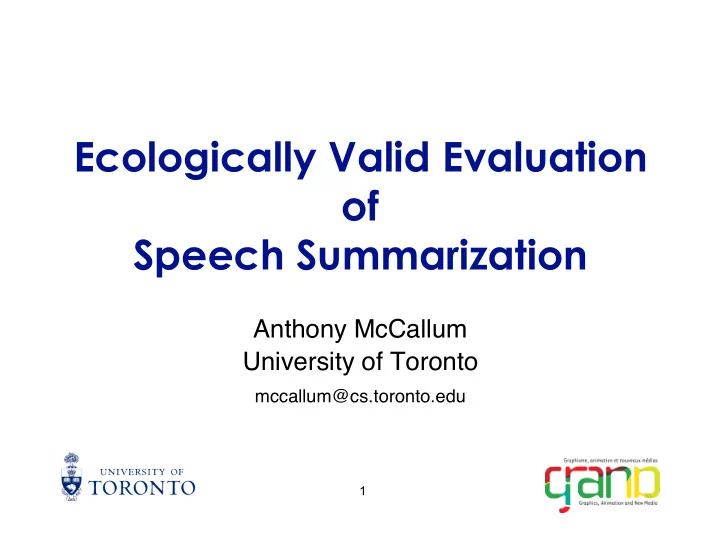

Ecologically Valid Evaluation of Speech Summarization Anthony McCallum University of Toronto mccallum@cs.toronto.edu 1
Spoken audio archives • Recording equipment • Compression and Storage • Distribution – Widespread broadband Internet 2
How can we use archived speech? • Given recorded meetings: How was a given decision made? • Given webcasted lectures: I missed a lecture and want to get up to speed • Given broadcast news: Tell me what happened • Etc. 3
How do we accomplish this? • Natural access to speech is linear • We want an aid that can – Tell us the ʻ gist ʼ of what is in the archive / webcast – Direct us to the portion of the archive where that content is – Be used in place of the original audio if time is limited • Our solution: Summarize! 4
Extractive summarization • Split audio into utterances – Separated by 200 ms pauses • Choose a percentage (5-30%) of utterances – Most salient / important – Determined by acoustic and lexical features • How do we know when we have chosen the correct utterances? – Evaluation • Intrinsic versus extrinsic 5
Intrinsic evaluation • Summary quality judged based on the content of the summary compared to a gold standard • Subjective • “Interesting” results: – Simple baselines perform very well • Length baseline • Even when compared to prosodic features 6
Extrinsic evaluation • Summary quality judged based on how well an external task can be completed given the summary • Ecologically valid! 7
Our study: ecologically valid extrinsic evaluation • Domain: university lectures – Spontaneous speech • Task: quizzes – TA designed – Time constrained (to ensure that summaries are useful) – Similar to university quizzes or exams (therefore ecologically valid) 8
What will we accomplish? • Provide an ecologically valid extrinsic evaluation framework for extractive speech summarization – Will prosodic features outperform simple baselines? • Determine what a validated gold standard summary should contain 9
Thank you! 10
11
Recommend
More recommend